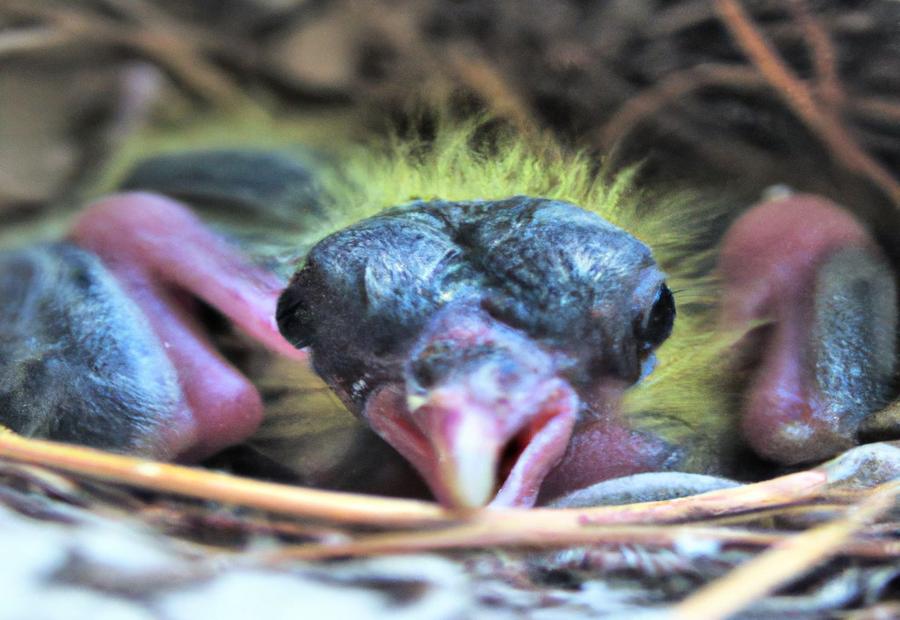Key Takeaways:
- Proper nutrition is crucial for the healthy development of baby pigeons, highlighting the importance of providing them with adequate nutrition.
- Baby pigeons naturally have specific eating habits, and understanding these natural eating habits can help in determining suitable feeding techniques for them.
- Feeding methods like using pigeon hatchling formula milk and homemade baby pigeon food are effective ways to ensure proper nutrition for baby pigeons, while alternative feeding techniques can also be explored.
- Creating a suitable environment, monitoring and timing feedings, and introducing solid foods gradually are important tips for the proper care of baby pigeons.
- Seeking professional assistance and providing proper care are essential for the well-being and growth of baby pigeons.
Introduction: Understanding the Diet of Baby Pigeons

Photo Credits: Chipperbirds.Com by Jacob Sanchez
Understanding what to feed a baby pigeon bird is crucial for its healthy development. In this section, we will explore the importance of providing adequate nutrition to these young birds and delve into the natural eating habits of doves or pigeons. By uncovering the optimal diet for baby pigeons, we can ensure their well-being and pave the way for their growth into thriving adult birds.
Importance of Adequate Nutrition
Nutrition is essential for the healthy growth of baby pigeons. They need a balanced diet with all the necessary nutrients. Parents or caretakers must provide the proper nutrition.
Two feeding techniques can be used to meet the needs of baby pigeons. Formula milk is specially formulated to mimic crop milk produced by adult pigeons. It has all the essential nutrients, vitamins, and minerals. Alternatively, homemade food can be prepared with ground seeds, cooked grains, and veggies.
Also, creating a suitable environment is important. It should be clean and safe. Monitoring and timing feedings are key for adequate nutrition. Gradually introduce solid foods as they grow for independent feeding in adulthood.
Eating like a bird has new meaning! Make sure to remember the importance of adequate nutrition when caring for baby pigeons.
Natural Eating Habits of Doves or Pigeons
Text:
Pigeons—or doves—have special eating habits that are important to know when caring for young ones. In the wild, they mostly eat seeds and grains like wheat, corn, barley, and millet. Plus, fruits and veg if they’re available.
Their beaks are made to crack open seeds and get the good stuff. They swallow food whole, digest it in their crop, then send it to the stomach.
In cities, they often look for food scraps or bread crumbs. This shows their ability to adapt and use what’s nearby.
So, it’s important to understand what these birds eat when caring for baby pigeons. Offering a mix of seeds and grains, plus high-quality formula milk or homemade baby pigeon food, will give them the best nutrition.
Now that you know how to feed them, let’s start cooking!
Feeding Techniques for Baby Pigeons

Photo Credits: Chipperbirds.Com by Ralph Anderson
When it comes to feeding techniques for baby pigeons, there are various options to consider. We will explore two primary methods: using pigeon hatchling formula milk and creating homemade baby pigeon food. Additionally, we will look at alternative feeding techniques that can be used in specific situations. By understanding these different approaches, you can ensure that the nutritional needs of baby pigeons are met effectively.
Feeding Method 1: Using Pigeon Hatchling Formula Milk
Pigeon hatchling formula milk is a must for baby pigeon nutrition. It’s specially designed to give them the nutrients they need. So, here’s how to use it:
- First, prepare the formula according to the instructions on the packaging.
- Use a syringe or dropper to give the baby pigeon a small amount of milk. Hold them gently with one hand and insert the syringe or dropper into their mouth.
- Let them swallow before administering more. Don’t overwhelm them with too much milk at once.
- Feed them several times a day, making sure to space out the sessions. They have small appetites and need frequent feedings.
- Clean any leftover milk from around their beak using a damp cloth or cotton ball. This helps maintain good hygiene.
Using pigeon hatchling formula milk gives the little ones the nourishment they need to grow strong. Plus, you don’t need a fancy kitchen to make it!
Feeding Method 2: Homemade Baby Pigeon Food
Homemade baby pigeon food is a great way to feed the birds. It offers an alternative to store-bought formula milk. You can control what goes into it.
Mix grains, seeds, and legumes that are suitable for the pigeons’ diet. Soak overnight to help digestion. Blend into a paste. Add water until it’s smooth. Serve in small amounts. Monitor the pigeons’ response and adjust.
Remember, homemade should not be the only food they eat. Start slow and take their natural eating habits into account.
Feed your baby pigeons well. Follow our guide and get professional help if needed. Watch them devour their food like it’s a 5-star restaurant!
Alternative Feeding Techniques
Feeding baby pigeons? Alternative methods exist! Caregivers can use a syringe to precisely control the nutrition amount. Or, a spoon to mash or blend food into a smooth consistency. As the baby pigeons grow, introduce solid foods, such as chopped fruits and veg, or bird food pellets. Tube feeding may be necessary in some cases. Social feeding helps promote healthy eating and socialization. Crop milk feeding is possible with a special formula. Before picking a technique, talk to avian professionals, for guidance and advice. Careful attention is necessary for baby pigeons to thrive.
Tips for Proper Care of Baby Pigeons

Photo Credits: Chipperbirds.Com by Matthew Taylor
When caring for baby pigeons, it’s crucial to provide them with the right environment, proper monitoring and timed feedings, as well as introduce solid foods at the appropriate stage. These tips are essential for ensuring the healthy growth and development of young pigeon birds.
Creating a Suitable Environment
Creating a suitable environment for baby pigeons requires effort. Provide them with a warm, safe, clean, and comfy living space.
Temperature control: Keep the temperature between 85-90 F during the first week. Reduce it by 5 degrees each week until they feather out.
Shield them from predators: Put mesh or netting over the enclosure.
Cleanliness: Clean their nesting area when they explore outside the nest. Use mild disinfectants.
Proper ventilation: Give them fresh air circulation. Keep windows open or use fans.
Mimic natural conditions: Provide perching surfaces, daylight, and enough space to exercise.
By taking these steps, you can create an environment that promotes their physical and mental well-being. Don’t miss out on the chance to give your baby pigeons the best environment. Align it with their natural habitat, ensuring their health and development.
Monitoring and Timing of Feedings
To care for baby pigeons, monitoring and timing feedings are key. Establish a feeding schedule to form a routine. Feed them every 2-3 hours, increasing intervals as they grow. Observe their behavior during meals. Note their appetite, speed, and interest in food. Monitor weight gain. Weigh them often to track growth. Consult with a vet for guidance on appropriate weight targets. With close monitoring and timing, you can ensure they get proper nourishment and detect any issues early.
More tips or recommendations may be needed based on individual needs.
Introduction to Solid Foods
Solid foods are key for baby pigeon development. They take them from a liquid-based diet to more solid nutrition. This provides essential nutrients and helps their digestive system. It’s vital to introduce solids at the right time for their well-being.
Start with small amounts of soft, digestible food like soaked or mashed grains and seeds. This allows them to get used to solids without overloading their digestive system. Gradually increase the texture and substance of the food.
Keep an eye on their response to different types of solids. Different birds have different preferences, so some trial and error will be needed. Make sure the food is age-appropriate and provides enough nutrition.
Include a variety of nutrient-rich solids in their diet. These include veggies, fruit and protein sources like cooked eggs or mealworms. But avoid anything that’s harmful or toxic.
Introducing solids is essential for baby pigeons. Gradually offer age-appropriate food and monitor their response. This will ensure they get the necessary nutrients for healthy growth and development. Caring for baby pigeons is a lot of work, but it’s important they stay entertained and nourished.
Conclusion: Caring for Baby Pigeons

Photo Credits: Chipperbirds.Com by Willie King
Caring for baby pigeons wraps up with important aspects: seeking professional assistance and the significance of proper care. Understand why seeking expert guidance is crucial, and how providing optimum care plays a vital role in nurturing baby pigeons.
Seeking Professional Assistance
Seeking professional help is smart when caring for baby pigeons. Expert advice from experienced professionals ensures the birds get the nutrition and care they need. They can guide you in feeding methods such as pigeon hatchling formula milk or homemade baby pigeon food. Plus, they know how to create a suitable environment for the birds to thrive and grow.
Professionals can also assist with timing feedings correctly. They can provide guidance on how often and how much to feed baby pigeons at different stages of their growth. They also help in introducing solid foods at the right time to support their transition into independent eaters.
Importance of Proper Care
Text:
Baby pigeons need special care. Nutrition, growth, and the environment are very important. It is vital to understand their natural eating habits and give them a diet that meets their needs.
Feeding techniques include pigeon hatchling formula milk or homemade baby pigeon food. This ensures they get the right nutrients for growth. Other ways of feeding may be explored, if needed.
Creating a comfortable, safe space is key. The temperature and lighting must be suitable. Monitoring feedings and having a schedule are also very important.
Seeking professional help is important too. If concern arises, consult a vet or an avian specialist.
Proper care is essential for baby pigeons. Nutrition, growth, and the environment must all be considered. Professional help should also be sought when needed. This will ensure they receive the best care to thrive.
Some Facts About What To Feed A Baby Pigeon Bird:
- ✅ Baby pigeons are fed crop milk by their parents in the first few days of their life. (Sources: pigeonpedia.com, birdfact.com)
- ✅ Alternative options for feeding a baby pigeon include using packed baby bird feeding formulas like Kaytee or making homemade baby pigeon food using chickpeas flour, cereal, and water. (Sources: pigeonkeeper.com, thayerbirding.com)
- ✅ Baby pigeons should be fed every couple of hours during their first week of life and gradually reduce the feeding times as they grow. (Sources: pigeonkeeper.com, birdfact.com)
- ✅ Proper feeding techniques include using a feeding syringe or alternative devices like an egg cup or disposable pipette with tubing. (Sources: pigeonkeeper.com, wikihow.com)
- ✅ As baby pigeons grow older, they can be fed defrosted peas, corn, wild bird seed, chopped apple, peanuts, fat balls, shredded greens, and wholemeal bread crumbs. (Sources: thayerbirding.com, birdfact.com)
FAQs about What To Feed A Baby Pigeon Bird
What should I feed a baby pigeon bird?
Answer: Baby pigeons should be fed a soft diet similar to regurgitated crop milk. You can use formulas like Nutribird A21 or Kaytee Exact Hand Rearing Formula, or make your own food using non-dairy infant cereals, soaked puppy biscuits, or soft fruits and vegetables.
Can I give dairy milk to a baby pigeon?
Answer: No, dairy milk should not be given to baby pigeons as they cannot digest it properly. It is best to stick to appropriate formulas or homemade foods that mimic their natural diet.
Where can I find a credible service to assist with baby pigeon care?
Answer: If you need assistance with baby pigeon care, you can contact a local wildlife rehabilitation center or bird rehabilitation center. These facilities have expertise in caring for orphaned or injured birds and can provide guidance on feeding and other aspects of care.
How often should I feed a baby pigeon?
Answer: Baby pigeons should be fed every two to three hours, starting after they have slept for at least 12 hours. The frequency and amount of feeding can vary based on the age of the baby pigeon, so it’s important to monitor their crop and adjust the feeding schedule accordingly.
Can I feed frozen peas or defrosted corn to a baby pigeon?
Answer: Yes, once a baby pigeon is older, around two weeks old, you can offer them defrosted peas or corn as part of their diet. These can be mashed or cut into small pieces for easy consumption.
What precautions should I take when feeding a baby pigeon?
Answer: It is important to ensure that the baby pigeon is warm before feeding, as they cannot digest food properly if they are cold. Additionally, it’s crucial to monitor their crop to prevent overfilling and the development of crop stasis. Seek assistance from a vet or bird rehabbers if you notice any signs of distress or if the bird is not self-feeding as expected.



